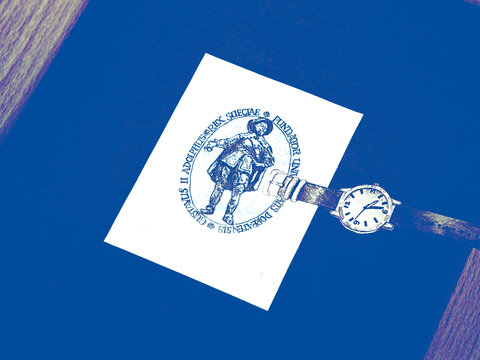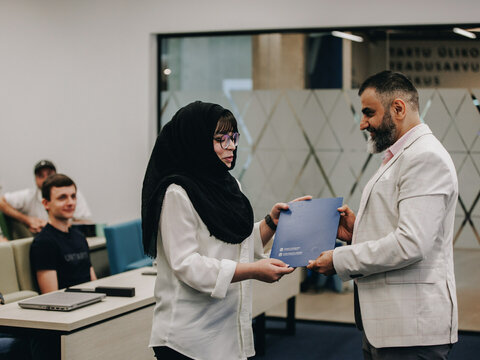Digital Educator ABC
-
Credits
2 ECTS (52 hours)
Form of study
Entirely web-based
Location
Veebis
Fee
free
Teachers
Anna Beitane
Study group
Social and behavioural sciences n.e.c.
Program language
English
Purpose:
The primary objective of the course is to introduce educators in Higher Education Institutions (HEIs) in Moldova with the principles and techniques essential for utilizing digital resources proficiently within their teaching methodologies. Through comprehensive instruction and practical guidance, participants will gain insights into various facets of digital resource integration, including but not limited to selecting appropriate digital resources, incorporating them seamlessly into lesson plans, and leveraging technology to enhance student engagement and learning outcomes. By fostering a deeper understanding of digital tools and their pedagogical applications, this course aimes to encourage eductors to adapt to the evolving landscape of education, equipping them with the skills necessary to navigate the digital realm effectively and enrich the learning experiences of their students.
Target group:
teaching staff of Higher Education Institutions (HEIs) in Moldova
Outcome:
A participant, who has successfully completed the course:-effectively selects and integrates digital resources into teaching practices;
-designs engaging visual resources and understand copyright laws;
-creates and implements digital assessments for student evaluation;
-designs and delivers engaging online teaching activities.
Starting conditions:
-Basic level of academic English (B2);
-Basic computer skills: ability to write and submit assignments via Moodle.
Teachers:
Anna Beitane - Anna Beitane is a Manager of Online Learning and Continuous Education Projects at the Johan Skytte Institute of Political Studies, University of Tartu (Estonia). Her primary responsibilities include developing and implementing online and blended courses (including MOOCs), and coordination of continuing education programs at the institute with a focus on seasonal schools and online courses. She also specializes in teacher training, emphasizing innovative teaching methods and online didactics, and oversees study-related projects centered on online learning, digital competences and EU-related topics (Europeanization, EU’s enlargement, European values and EU’s Neighbourhood). Content:
| Topic | Credit | Lectors |
|---|---|---|
| 1. Module 1: Work with digital resources Webinar |
13 | Anna Beitane |
| 2. Module 2: Creation of online visual learning resources & copyright Webinar |
13 | Anna Beitane |
| 3. Module 3: Development of digital assessment (quizzes, peer-assessment online) Webinar |
13 | Anna Beitane |
| 4. Module 4: Online teaching activities & didactics (webinars; recording lectures, etc.) Webinar |
13 | Anna Beitane |
Price info:
The course is free of charge
Location info:
The course takes place in the Moodle online environment.
Learning environment:
Learning takes place in the online learning environment, which presupposes that students have good ICT and web communication skills.
Schedule and further information:
The course is developed within the framework of ESTDEV project "Estonia's best practices for enhancement of Moldova's higher education capacities (EST4MORE)"The course takes place fully online in the Moodle learning environment of the University of Tartu. The course consists of 4 Modules:
Module 1: Work with digital resources
Module 2: Creation of online visual learning resources & copyright
Module 3: Development of digital assessment (quizzes, peer-assessment online)
Module 4: Online teaching activities & didactics (webinars; recording lectures, etc.)
In addition to resources on Moodle, the course is accompanied with 4 synchonous webinars in Zoom. Lecturers need to read the materials and complete short quizzes upon the completion of the module on Moodle. At the end of the module, teaching staff participates in a live-seminar with the UT instructor, where they discuss each issues in more detail and engage in peer-and group activities in the Zoom break-out rooms.
Requirements to complete:
To pass the course participants should attempt each assignment and receive in each of them at least the minimum amount of points. In order to pass the course the final computation of points should not be lower than 55 points.
Outcome method:
non-differentiated (pass, fail, not present)
Grading method:
The course consists of 100 points. To pass the course participants should attempt each assignment and receive in each of them at least the minimum amount of points. In order to pass the course the final computation of points should not be lower than 55 points.The final assessment of the course consists of the following elements:
-4 multiple-choice quizzes = max 40 points (10 points per quiz), min. 20 points
-active participation in 4 webinars = max 20 points (5 points per webinar), min 10 points
-final reflection = 40 points, 25 points
In addition, participants also need to take part in two forum discussions, organised between Module 2 and 3. Participation in the forum discussion is a prerequisite to pass the course.
Grading criteria:
Quiz – short multiple-choice quizzes are organized between Module 1 – 4 and are aimed at testing basic knowledge and understanding of learning material. The quizzes will be focused on terminology discussed during the specific module. The test consists of 10 questions, giving 1 point per each correct answer. The quiz can be taken twice with no penalty. The submission with the maximum score is used as the effective score for that quiz. The following assignment gives 40 points in total towards the final grade. Participants need to score at least 20 points to successfully pass the assignment.
Webinars – synchonous webinars will be organzied at the end of each respective module. Participants are expected to actively participate in webinars and group activities during the session. The following assignment gives 20 points towards the final grade. Participants need to score at least 10 points to successfully pass the assignment.
Final reflection (self-assessment) – this task consists of two parts. In the first part, participants will evaluate their own e-courses based on the "Moodle Self-Assessment Baseline for E-Courses" presented by the course organizers. In the second part of the assignment, participants will provide their feedback on the self-assessment form they had to fill in the first part of the assignment, reflecting on their overall experience of assessing their own e-courses. The following assignment gives 40 points in total towards the final grade. Participants need to score at least 25 points to successfully pass the assignment. The first and second part of the assignment gives 20 points (each) towards the final grade.
Document to be issued:
Certificate of completion
Additional information:
Anna Beitane, anna.beitane@ut.ee, +372 +372 737 5198
Program code:
SVJS.TK.066
General contact:
Similar lifelong learning courses
Time of occurrence:
02.09.2024
-
29.06.2025
Credits: 12 ECTS (312 hours)
Form of study: Partially web-based
Language: Estonian
Time of occurrence:
30.08.2024
-
31.08.2025
Credits: 60 ECTS (1560 hours)
Form of study: Partially web-based
Language: Estonian
Time of occurrence:
02.09.2024
-
29.06.2025
Credits: 12 ECTS (312 hours)
Form of study: Classwork
Language: Estonian
Time of occurrence:
02.09.2024
-
02.02.2025
Credits: 4 ECTS (105 hours)
Form of study: Entirely web-based
Language: English
Time of occurrence:
02.09.2024
-
29.06.2025
Credits: 18 ECTS (468 hours)
Form of study: Partially web-based
Language: Estonian





